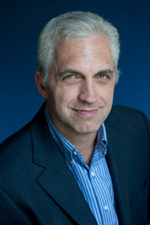Jeffrey Jensen Arnett, Ph.D., presented the opening workshop of the annual School of Social Work Summer Institute.
by Ela Schwartz
 Jeffrey Jensen Arnett, Ph.D., researcher and professor at Clark University, Fulbright scholar and author, made a name for himself when he questioned whether a new developmental stage of life—one not outlined by eminent psychologists such as Sigmund Freud or Erik Erikson—had arrived. Individuals aged 18–29 were no longer marrying, establishing careers and having children at the same rates as previous generations during this period of life. Neither were they still in the midst of teen rebellion and self-absorption. For this group, no longer adolescents and not yet young adults, he developed his theory of a new life stage, one he termed “emerging adulthood.”
Jeffrey Jensen Arnett, Ph.D., researcher and professor at Clark University, Fulbright scholar and author, made a name for himself when he questioned whether a new developmental stage of life—one not outlined by eminent psychologists such as Sigmund Freud or Erik Erikson—had arrived. Individuals aged 18–29 were no longer marrying, establishing careers and having children at the same rates as previous generations during this period of life. Neither were they still in the midst of teen rebellion and self-absorption. For this group, no longer adolescents and not yet young adults, he developed his theory of a new life stage, one he termed “emerging adulthood.”
And what better place to discuss emerging adulthood than on a college campus? On July 15, 2013, at the Performing Arts Center, Dr. Arnett kicked off the Adelphi University School of Social Work Summer Institute as he addressed an audience of mental-health professionals, educators, parents and the emerging adults themselves for a six-hour workshop called “Are College Students Adults? Emerging Adulthood: A New Stage of Development.”
Dr. Arnett shared his insights as well as statistics from the Clark University Poll of Emerging Adults (2012), a national survey he directed based on 1,029 interviews of 18–29-year-olds. He categorized emerging adulthood as a period of:
- Identity exploration: seeking careers and relationships that provide self-fulfillment
- Instability due to changes in relationships and employment, which can result in stress and anxiety
- Self-focus (which Dr. Arnett clarified is not the same as selfishness)
- Feeling in between: not a kid but not yet an adult
- Possibilities: Most are hopeful about the future
The event was more of a conversation than a presentation, as attendees shared their professional and personal opinions on everything from counseling high school students on college goals to helping adults approaching their 30s overcome lingering substance abuse and anxiety issues. Although older demographics may perceive this age group as self-absorbed, Dr. Arnett pointed out that 86 percent of the young people surveyed said they felt it was important to have a career that does some good in the world. Their optimism and idealism are part of what “makes them so much fun,” he said.
During breaks, Dr. Arnett spoke one-on-one with attendees and signed copies of his books, Emerging Adulthood: The Winding Road from the Late Teens through the Twenties (2004, Oxford University Press, 10th anniversary edition scheduled for 2014) and When Will My Grown-Up Kid Grow Up? (Workman Publishing, 2013).
Audrey Freshman, Ph.D., director of continuing education, said the workshop set the stage for the subsequent presentations that “addressed the mental health, substance use, social, cultural and romantic ties emblematic of this generation,” she said, adding that the “most poignant moment” for her was when three B.S.W. students attending Adelphi spoke to the audience about their respective struggles overcoming cultural, familial and personal adversity. “These students shined a light on resiliency and made the case that, at the end of the day, one generation has to place their faith into the hands of the next.”
For further information, please contact:
Todd Wilson
Strategic Communications Director
p – 516.237.8634
e – twilson@adelphi.edu